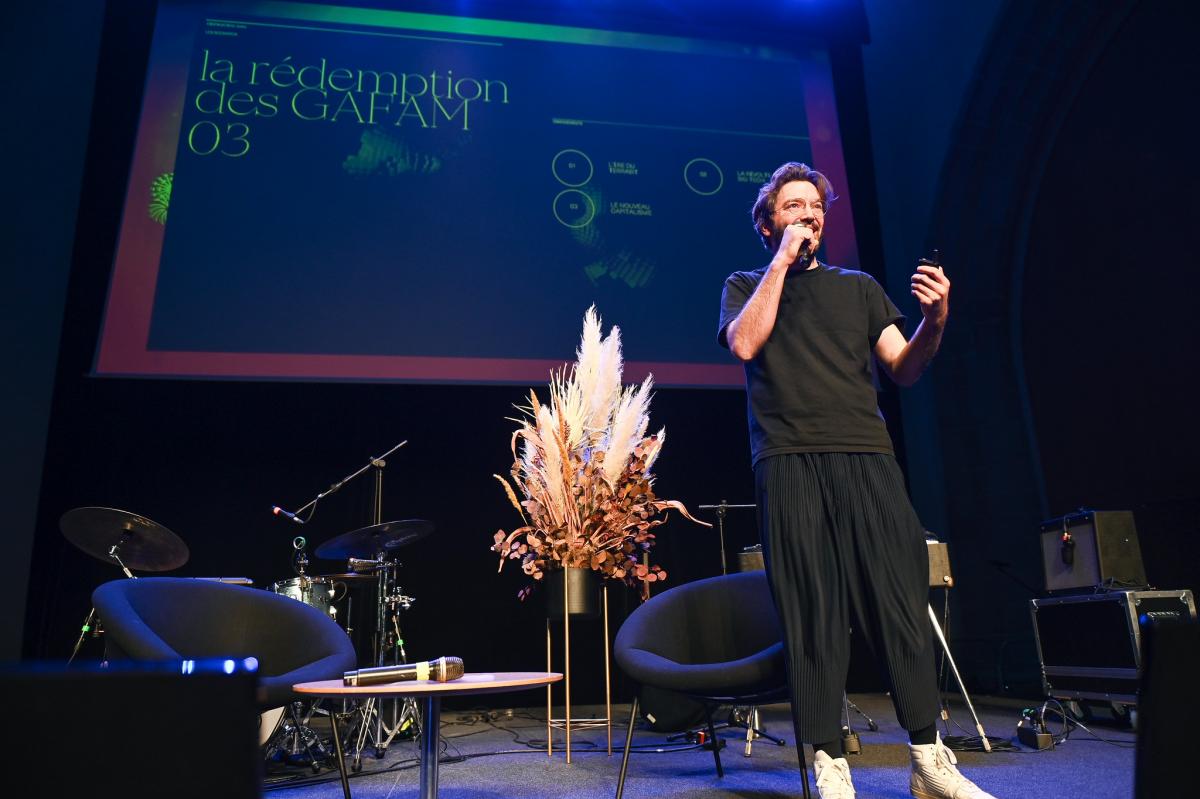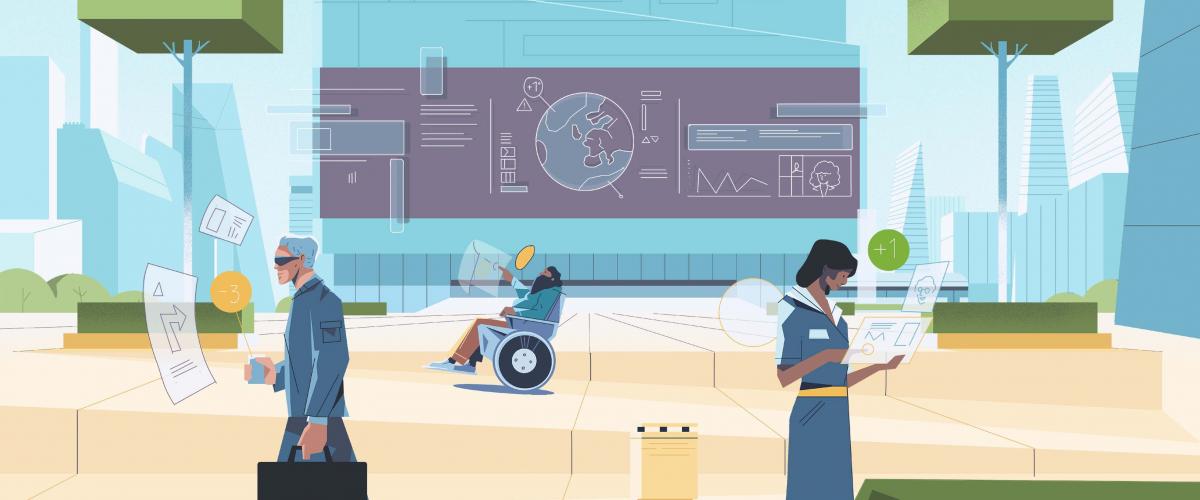Designer and futurist Julien Tauvel, co-founder of the Design Fiction collective Imprudence, has partnered with b<>com to imagine possible futures together, around the concept of responsible digital technology. At the 6th Digital Tech Conference in December, Julien presented in exclusivity the first scenarios resulting from our collaboration. An interview with a visionary partner.
Julien, can you tell us what Imprudence is?
Imprudence is a multidisciplinary collective that seeks to refresh the technological imagination. The studio was initially built from the desire to show other creative possibilities with technologies. AI is not just an optimization technology. VR is not just a technology for reproducing reality or for gaming. As we pushed the boundaries of these technologies further and further, in the manner of concept cars, we discovered a discipline that fascinated us: Design fiction. Inspired by the methods of MIT and Hollywood world-building, we have developed our own approach to design fiction. As multidisciplinarity is key to exploring all the aspects of tomorrow's worlds, we rely on several skills: Designers, creative technologists, researchers, and storytellers. What makes our approach unique is the way we turn these futures into something tangible. After all, how could we understand these futures without experiencing them? Coming from the video game, audiovisual, and digital industries, we focus on creating immersion. Our goal is to show that the future is not a self-fulfilling prophecy but that it is possible to invent the future we want. However, we are careful not to fall into mere science fiction, by incorporating feasibility and plausibility criteria into our futures. Today, we work for clients such as Total, L'Oréal, LVMH, Danone, and others. Our clients are companies that already have a strong culture of innovation, or even their own internal laboratories. Our role is to show them other paths of innovation, outside the beaten path and the normative frameworks of their industry.

How did the partnership with b<>com come about?
Several years ago, b<>com initiated a process and actions around the subject of looking into the future, and discovered our work. From the first meeting, we realized that we had great things to do together! The collaboration has taken shape around the forward-looking project "Echos”, which explores responsible digital technology for the year 2040. Among all the research areas considered, our role was to carry out a design fiction exercise to imagine responsible digital technology in 20 years.
To imagine these possible futures, we went through several steps. The first step is to determine the setting of our futures, by looking at trends in demography, education, politics, etc. Then comes the technology: Which technologies will define our future, which ones we will have to deal with, which ones will bring new solutions, which ones will only be in their infancy. To finish setting our scene, we obviously looked into practices, sociology, and anthropology. Now that we have defined a framework of plausibility, desirability and feasibility, we need to explore the weak signals, the possible disruptions along the digital value chain, the innovations brought by the labs, the interdisciplinary design centers, the speculative approaches, and so on. Only once these elements are in place will it be possible to tackle the “world-building” part, from which the forward-looking scenarios will emerge. For b<>com, we have selected four of them.
Can you tell us about these four scenarios?
In the first scenario, which we have entitled Living in digital archipelagos, societies are reorganizing themselves into a multitude of digital archipelagos, each offering its own solutions to the challenges of the century. The key points here are the reappropriation of digital technologies (we own our own servers, we print our sensors and wearables, etc.) to create independent communities, where resource management, peer-to-peer sharing of skills, and inter-generationality create the conditions for a new way of living together.
In the second scenario called Tame the Digital, Save the World, Europe sees itself as the responsible technological power of the century by founding a European plan for Digital and the Environment. The main revolutions are the individual carbon tax and the eco-coin. From a macro point of view, digital technology is seen as a common and inclusive good, and the focus is on individual empowerment and the tokenization of exchanges.
We have entitled the third scenario "Reinventing the Factory of the Future". Here, due to social pressure and business opportunities, private digital champions are transforming their tools and technologies into drivers of environmental change. What was once pollution becomes a positive-impact solution. Data centers become hydroelectric plants, e-waste becomes a windfall for clean technologies like electric cars, and soft wearables help reduce our individual impact.
Finally, in the last scenario "Succeeding in the digital bio-revolution", we imagine a world where natural resources linked to digital technology have almost disappeared. Digital technology must change, and anthropocene pressure makes living things more central to our societies. Digital technology then follows this new path, between ore-creating bacteria, DNA storage, and plant interfaces.
Find the exclusive presentation of these 4 scenarios by watching Julien Tauvel's speech at the Digital Tech Conference (in french).
On a personal level, how do you imagine responsible digital technology in 2040?
All of the proposed scenarios represent, in their own way, a facet of tomorrow's digital responsibility. It is unthinkable that American Tech Giants will not enter the cleantech and positive impact race. This makes it logical for Europe to seeks to assert itself internationally around new development values, the question is how far will we go? The siloing of our societies already exists, as do the more radical models of self-sufficiency. Also, I think we will see some aspects of the first three scenarios co-exist. On a more personal note, I would love for the fourth scenario to happen, and for the organism-based revolution to be our future. It may be science fiction today, but I will push to make it happen ;)
How does the partnership with b<>com differ from what you are used to doing?
The biggest difference from other partnerships is the time horizon. In design fiction, we are usually on a ten-year time frame. Through the "Echos" project, we are looking forward to 2040, and the fact that we are pushing the envelope allows for more creativity than traditional exercises. In this partnership, it is also extremely beneficial to be able to talk with specialists and collect sociological, legal or anthropological points of view on the different scenarios, while also hearing the perspectives of researchers who specialize in a particular technology, regarding how they perceive the future of that technology.



